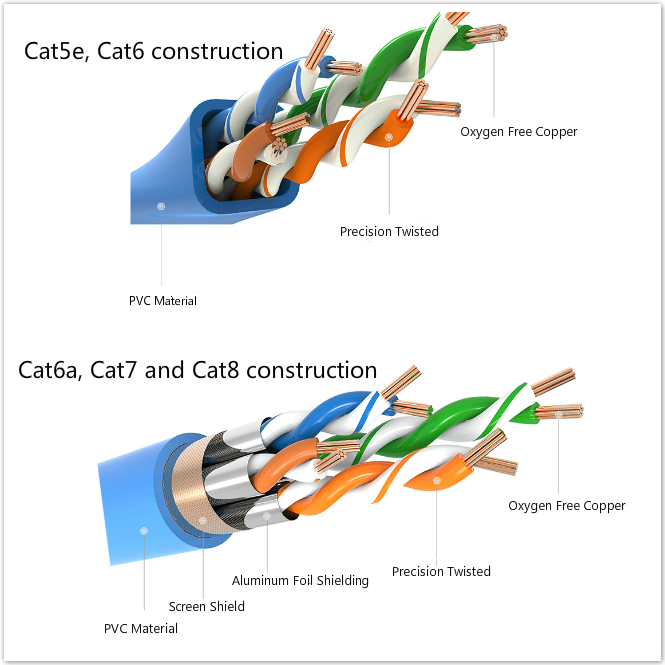Ethernet cables are the default physical connection for today’s home or business networks. People always want to buy a high speed Ethernet cable to enjoy a high speed network transmission. However, will different Ethernet cable speed actually affect your networks? Here, we’ll discuss the speeds of the most popular Ethernet cables categories (Cat5, Cat5e, Cat6, Cat6a, Cat7 and the newest Cat8), to help you make a wise choice.
Ethernet Cable Speed of Different Categories
The following is the overview of Ethernet cable speed of Cat5, Cat5e, Cat6, Cat6a, Cat7 and Cat8.
Cat5 Ethernet cable is the oldest type of these cables. It can support either 10Mbps or 100Mbps speed with a bandwidth of up to 100MHz, which was the first Fast Ethernet-capable to be introduced. However, with technology develops, this old-fashioned cable is no longer a recognized standard, that it’s hard to find it in today’s stores.
Cat5e is an enhanced version of Cat5 cable. This Ethernet cable speed is up to 1000Mbps or “Gigabit” speed. In theory, it could be ten times faster than Cat5. Besides, it decreases crosstalk that happens between two wires inside a cable. Cat5e Ethernet cable is the most widely used category on the market.
Cat6 is certified to handle Gigabit speed with a bandwidth of up 250MHz. And it can be capable of 10Gbps speed under ideal circumstances. Cat6 Ethernet cable has some improvements like the better insulation and thinner wires, providing a higher signal-to-noise ratio. Thus, it’s quite suited for environments with higher electromagnetic interference. Note that, Cat6 Ethernet cable is provided with two forms, shielded twisted pair (STP) and unshielded twisted pair (UTP).
Cat6a Ethernet cable allows 10Gbps data transmission rate with the bandwidth of up to 500MHz. Its transmission can achieve to 100 metres, which is longer than the 37-55 metres of Cat6 cable. Cat6a is usually available in STP form. This cable is ideal for industrial situation, but lack flexibility that is often needed for a residential deployment.
Ethernet cable speed of Cat7 can reach to 10Gbps with a bandwidth of up to 600MHz. It consists of a screened, shield twisted pair of wires, which completely eliminates alien crosstalk. It’s more suited to data centres than home use.
Cat8 is capable of supporting bandwidth of up to 2000MHz. This Ethernet cable speed can be up to 25/40Gbps. It’s the fastest Ethernet cable, which is not intended for office environments, but suitable for connecting equipment in data centres such as connecting server to switch.
For better reference, the following table lists the Ethernet cable speed and bandwidth of these cables.
|
Category
|
Speed
|
Bandwidth
|
|
Cat5
|
10/100Mbps
|
100MHz
|
|
Cat5e
|
1000Mbps
|
100MHz
|
|
Cat6
|
1000Mbps
|
250MHz
|
|
Cat6a
|
10Gbps
|
500MHz
|
|
Cat7
|
10Gbps
|
600MHz
|
|
Cat8
|
25/40Gbps
|
2000MHz
|
Technical and Physical Differences
The typical technical differences are clear to see. As the category number increases, so does the Ethernet cable speed and bandwidth. This is not a coincidence, because each category brings more rigorous testing to eliminate crosstalk and add isolation between the wires. Thus, Cat8 supports the highest transmission speed.
As for the physical differences, Ethernet cables use different construction and isolation to eliminate interference and allow for faster speeds. Take the cables from FS.COM as an example. Its Cat6a, Cat7 and Cat8 use screen shield and aluminum foil shielding for reducing crosstalk, while Cat5e and Cat6 don’t. So Cat6a, Cat7 and Cat8 have better performance.
Is It Worth to Upgrade?
Actually, for home connections, a Cat5e or Cat6 cable with 1Gbps Ethernet cable speed is fast enough. People should note that upgrade cables will not make a difference in how fast you load websites, because the Internet speed depends on many factors but not just the Ethernet cable speed. But for places like data centres, of course, the faster the better. Because these places have high requirements for transmission speed. If you decide to buy Ethernet cables, welcome to order at FS.COM that provides comprehensive products of Ethernet cables.

